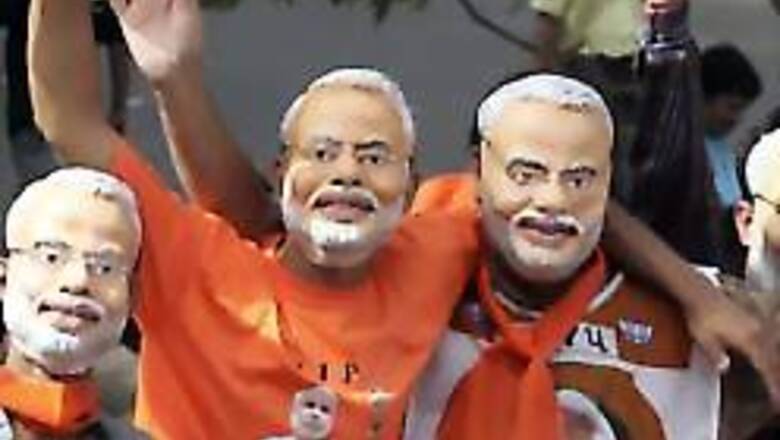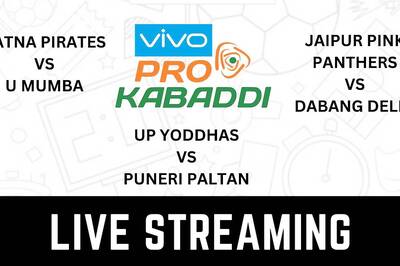
views
Modi’s stunning victory in Gujarat has all the elements of a classical Indian style electoral wave. It levelled the usual political divisions of the state: different political regions, urban centres as well as rural hinterland and different phases of polling behaved in a similar fashion.
Barring a part of central Gujarat that returned to Congress after an abnormal fluctuation in 2002, the rest of the state returned nearly a uniform verdict.
The wave swept aside all the factors that caught media attention: rebels, internal dissentions, local disaffection and caste-community equations. Modi wanted this election to be a plebiscite on him and the gamble paid off.
Party
Seats projected to win
Like all waves, the pollsters failed to foresee the force of this wave. While all the polls projected a victory for the BJP no one predicted a two-thirds majority.
The projection made by us on the basis of Indian Express - CNN-IBN—Divya Bhaskar poll fared a shade worse than others; perhaps we corrected more for silence and over-reporting than others.
As it turned out, the raw, uncorrected data from the survey would have been closer to the final outcome. Here then is the lesson for psephologists: trust your respondents and learn to listen to them.
This victory has deceptive similarities with the earlier BJP victories in the BJP tally of 117 and the lead of 11 percentage points over the Congress are bound to look like a repeat of the last three elections.
Yet the political picture is anything but static: the similarity of data hides two opposite movements and a crucial shift. The BJP did lose votes due to a wide range of micro-factors that were arrayed against it.
Party
Vote share (%) 2007
But all the losses were compensated by the gains made on the basis of one macro factor called Moditva. Modi has done to BJP in Gujarat what Indira Gandhi did to the Congress in 1971: he has retained the old banner but invented a new party by appealing to the voters bypassing his old party organization and established leaders.
This election may be remembered as the Moditva wave and perhaps rightly so. But the point is to recognize what constitutes Moditva. This is not an irrational personality cult. Like all charismatic and authoritarian politicians, Modi responds to some deep quest of an ordinary citizen.
He appears to be the dedicated and clean yet effective and strong leaders that citizens yearn for in a democracy. Moditva no doubt echoes Hindutva and carries an element of unadulterated politics of hate.
Yet Moditva cannot be reduced to Hindu communalism; it is a clever recasting of Gujarati nationalism in a communal frame. The third element in the package called Moditva may be called development, but it is not merely the 12-14 per cent economic growth that economists talk about.
CNN-IBN EXIT POLL: READ FULL STORY
His success lies in ensuring that some benefits of this growth percolates to ordinary Gujaratis and, more importantly, he gets personal credit for that.
The uniqueness of this package makes it difficult if not impossible to export Moditva outside Gujarat.
The BJP’s national leadership is too clever, and too scared of Modi, to try and blindly repeat one element Moditva – politics of hatred – across the country or to invite him to be the party’s mascot. They are also too mature to believe their own rhetoric about the party being on a comeback trail.
They know that a victory in Gujarat, plus in all probability Himachal, will be followed by tougher and less promising battles in Karnataka, Rajasthan and Madhya Pradesh.
This could look like a ray of hope on a day a democratic verdict appears to have underlined illiberal possibilities inherent in any democracy. But this realization could also lull secular politics is into complacency.
This kind of complacency is but the other side of the despondency shown by Congress and Left politicians in responding to the BJP’s victory.
To see this outcome as a product of communal division is to completely misunderstand the nature of this verdict. The BJP victory this time is not a repeat of the communal formula of 2002.
Modi did benefit from the charged atmosphere of the last 10 days but that cannot explain the margin of his victory. Nor can it explain his victory in regions like Saurashtra where there was no communal polarization.
Worse, this kind of response fails to understand the political challenge of the dark face of democracy. Blaming the people and their attitudes is not an option open to a democrat, certainly not to a party like the Congress that has done little to take on Moditva brand of politics in the five years since 2002.
The only democratic and political option is to learn the language that people speak and understand. Gujarat then has a lesson for politicians as well: trust the people and learn to speak to them.




















Comments
0 comment